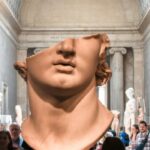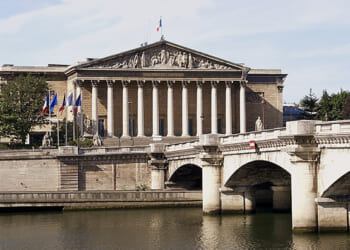Two decades ago, Christian Smith and Melinda Denton discovered that nearly all US teens, regardless of their religious upbringing, shared a common belief system. They named this religion “Moralistic Therapeutic Deism,” which they summarized into the following tenets:
- A God exists who created and orders the world and watches over human life on earth. [Deism]
- God does not need to be particularly involved in one’s life except when needed to resolve a problem. [Therapeutic]
- God wants people to be good, nice, and fair to each other, as taught in the Bible and by most world religions; the central goal of life is to be happy and to feel good about oneself. [Moralistic]
- Good people go to heaven when they die. [the Conclusion]
Whether today’s Americans precisely adhere to these tenets is not in question here. (We know that these teens’ beliefs sprang from generations of adults preceding them.) But regardless, these tenets identify an excellent starting point to battle current-age thinking and behavior to ensure that we imitate Christ and become saints.
More importantly, knowing ourselves and our born-and-bred tendencies, we can feel that these tenets are what we too often believe and act on. Whether we are traditional Catholics, the poorly catechized, converts, or born-again Evangelicals—these tenets are dead-on what we battle against, inside, daily.
Fighting mainstream thinking is not easy. That is especially true here because the battle must begin by stating the following: “The Moralistic Therapeutic Deism deity is incomplete, deficient, and restricted. It is not the Holy Trinity.” We ought to repeat these words in conversations, homilies, confessions, Bible studies, essays, art, literature, podcasts, and movies. And especially in our private petitions and meditations.
In framing this battle, notice that those four error-laden Moralistic Therapeutic Deism tenets map to each of the four basic cosmological questions, which everyone asks at some point:
- Where did we come from?
- How do we fit in?
- What should we do?
- Where are we going?
Like all heresies, Moralistic Therapeutic Deism extracts a few nice, easy-to-explain aspects of Christianity into its alluring but dangerous “broad-path” answers. Its errors dilute two primary theoretical and operational categories, which also map to the four cosmological questions. Those two categories lay the foundation to distinguish original Catholic Christianity from other religions. They are: Reality and Purpose.
Reality answers the question: What is the one most significant and True entity that humans encounter in existing? The Catholic Christian answer to this question is the Holy Trinity.
Purpose answers the question: What is the one most significant driver that impels the True Reality, and humans, toward the most Good end? As Catholic Christians, our answer to this question is the creation and sustainment of the universe and life, including our souls, toward the Holy Trinity’s revealed, designed perfection.
To help counter Moralistic Therapeutic Deism, this essay traces the origins of its source errors, which deviated from original Catholic Christian teachings and infiltrated the mainstream. For more detail, authors such as Hans Boersma (Heavenly Participation, 2011) and Michael McClymond (The Devil’s Redemption, 2018) masterfully expose these origins. This essay also recollects essential ancient practices designed by the Holy Spirit and the saints to counter each now-pervasive error in the battle for souls.
1. Where did we come from?
Deist vs Trinitarian
The Moralistic Therapeutic Deist puts forth this reality: “A God exists who created and orders the world and watches over human life on earth.”
The original Catholic Christian reality is Trinitarian, proclaiming that the Triune God Who created us is perfect, eternal, inconceivable, and incomparable to humans and other created things; we comprehend Him only through imperfect analogy.
Despite the comprehensive Scriptural basis for this Trinitarian Divine Nature, the modern Christian and secular adopt a deity that is “just another being,” who happened to create us and who monitors us from afar. This springs from the 1300s theory called Univocity. In Univocity, “God’s being and created being are identical in kind” (Boersma).
Christianity recognizes the Three Persons of the Trinity as the perfect, eternal, infinite Divine Nature, but the Deist human-constrained being-deity is easier to relate to. Christianity does use insufficient analogies to help know the Trinity. Unfortunately, the last 700 years and its hubristic drive for certainty have seared Deist analogies (such as the old man on a far-off throne, the watchmaker, etc.) too much into our modern minds.
For the inner and outer struggle to cast off Deism, Catholic Christians can employ this devotion: The Divine Office. These twice-or-more daily vocal prayers and spiritual readings bring to life the reality of the Divine Nature, using Psalms, petitions, hymns, and Gospel readings, including the Magnificat, to describe where we came from.
2. How do we fit in?
Therapeutic vs Indwelling
Moralistic Therapeutic Deists exist in a reality in which “God does not need to be particularly involved in one’s life except when needed to resolve a problem.”
Catholic Christians, in stark contrast, know the Indwelling: that the Holy Trinity always dwells within our souls.
Despite the Scriptural basis (such as Lk. 17:21, Jn. 14:19-23) for the soul-indwelling Trinity, the modern Christian and secular embrace the Moralistic Therapeutic deity’s constrained functional existence in the world. This deity manifests itself exactly how, when, and why humans want: in order to solve worldly problems. But for Catholic Christians, the Trinity dwells within our souls, continuously but most often silently and humbly, obstructed by dozens of our own barriers.
Like the truth about the Trinity and the Eucharist, this truth about the soul-indwelling Trinity requires us to believe first and comprehend second. The understanding is similar: we must believe and know that created objects (such as bread and ourselves) have both essence/form/existence and action/function/substance. The Trinity mysteriously dwells in and reigns over that invisible and most fundamental realm of essence/form/existence.
But in the 1300s, the theory called Nominalism conjectured that the essence/form/existence part was unnecessary, just a name, thus further constraining God from operating and dwelling in the invisible, underlying reality. This theory gave rise to many errors, such as the Eucharist only symbolically representing Christ, and such as a therapeutic deity that only exists outside our souls, only summoned whenever we need help with a personal issue.
To join the battle, within and without, against this prevalent concept of a distant yet convenient deity, Catholic Christians can use a most powerful, ancient weapon: contemplative prayer. In contemplative prayer, as practiced by Christ and the early Christians, and as recovered for the modern era by saints like St. Teresa of Avila, we learn to gaze with love at God in silence. We inch closer to union with God, Who is indwelling “where the most secret things pass between God and the soul” (St. Teresa). In time, we discover how we fit in reality, as we experience that this work is God’s.
3. What should we do?
Moralistic vs Agape
Moralistic Therapeutic Deists concur one-and-all on human purpose: “God wants people to be good, nice, and fair to each other, as taught in the Bible and by most world religions; the central goal of life is to be happy and to feel good about oneself.”
But Catholic Christians know that God designed human life to love (agape) both Him and those needing our love. Also, as Christ clearly delineated, loving God means accepting and living out His commandments. Not our own. Part of the design itself is for God to reveal the meaning of agape-love as Eternal Law, such as in the Ten Commandments, in the Beatitudes and the Sermon on the Mount, in the rest of the New Testament, and in the instruction handed down through the Church.
Despite the Scriptural basis (such as Mk. 12:29-31, Jn. 14:15) for designed agape-love linked to following God’s commandments, the modern Christian and secular accept the 1300s theory called Voluntarism. This theory flung open the doors to human-biased laws, different from those revealed in Scripture. A Voluntarist approach asserts that God’s power was absolute, thus the deity could change law at any time. It follows that humans, being recipients of revelation, will derive their own versions of updateable law, such as one that makes emotional sense to us, including Moralistic Therapeutic Deism’s concept of “a good person.”
St. Thomas Aquinas recognized that while this theory seems to make God more powerful, it actually constrains Him to not have a pre-ordained design, to be merely reactive to human history and free will. Aquinas defended the traditional approach: the power that God chooses is pre-designed. That is, God exerts His absolute power in a pre-ordained manner, within His fixed, eternal system of invisible universals and essences, which all created things hold. God, not humanity, sets His Eternal Law beyond human time. He reveals in Scripture that unchanging Law, which He designed for human happiness.
In the fight to understand and keep this revealed Law and purpose, and to “be not conformed to this age,” Catholic Christians can wield another age-old tool: the Examination of Conscience. In this practice, one meditates about one’s thoughts and deeds against a guiding list of Eternal Law-based teachings on sin and agape-love. The goal of course is not to trigger scruples or despair, but to trigger humility and contrition. An Examination of Conscience helps us recollect what we should do, how to better love the Trinity by keeping the Eternal Law.
4. Where are we going?
Universalist vs Graced
Regarding purpose, the Moralistic Therapeutic Deist conclusion is Universalist: “Good people go to heaven when they die.”
But original Catholic Christians re-focus human purpose on obtaining what the Holy Trinity provides: Grace. Catholic Christians know that the purpose of our earthly lives is to accept God’s grace and to perfect our souls so we can participate in the Beatific Vision.
Despite the Scriptural basis (such as Mt. 7:13-14) for particular graced salvation, the modern Christian and secular took up the widespread Universalist notion that Christ’s opening the gates of Heaven makes it easy to get in.
Universalism proclaims that the “work has already been done” and that almost everyone is universally entitled to enter. It asserts that the New Covenant constrains God to save even those who behave horribly but only affirm faith (sola fide), or maybe those who reject the Holy Trinity before, or even after, life’s end. From Universalism arises the proclamation that hell is empty.
We can hope that the pre-ordained will of God provides such a merciful heavenly future for all humankind. But given the preponderance of Scriptural teachings and experiences of saints, the Moral Therapeutic Deistic Universalist conclusion simply does not follow. Jesus’ own words in the Gospel make near-Universalism a risky theory by which to live and die. And again, it constrains God; that is, Universalism nullifies the decisive choice God designed for each soul: to accept His love and love Him back, or not.
Again, for the battle, an ancient practice rises up for original Catholic Christians, in order to reassert this holy purpose. In this case, the practice is everywhere and continuous. But for this battle, in this practice, the Catholic Christian focuses on the salvific grace bestowed there due to our own too-meager sacrifices and the perfect Sacrifice offered: the Holy Mass. In contemplating the Sacrifice in the Mass, we re-establish in us what was done to secure where we are going.
In summary, each of the four Moralistic Therapeutic Deism tenets provides common modern answers to the four basic cosmological questions regarding reality and purpose. Those answers express a limited version of the Holy Trinity. In so limiting God, these errors also limit the soul and endanger it, especially if more error builds on top of these errors. But the Holy Spirit provides Catholic Christian answers and at least four ancient practices to combat these modern errors. If one perseveres in these practices, they allow God to work in us and so cannot fail.
Photo by Daniel Tran on Unsplash















